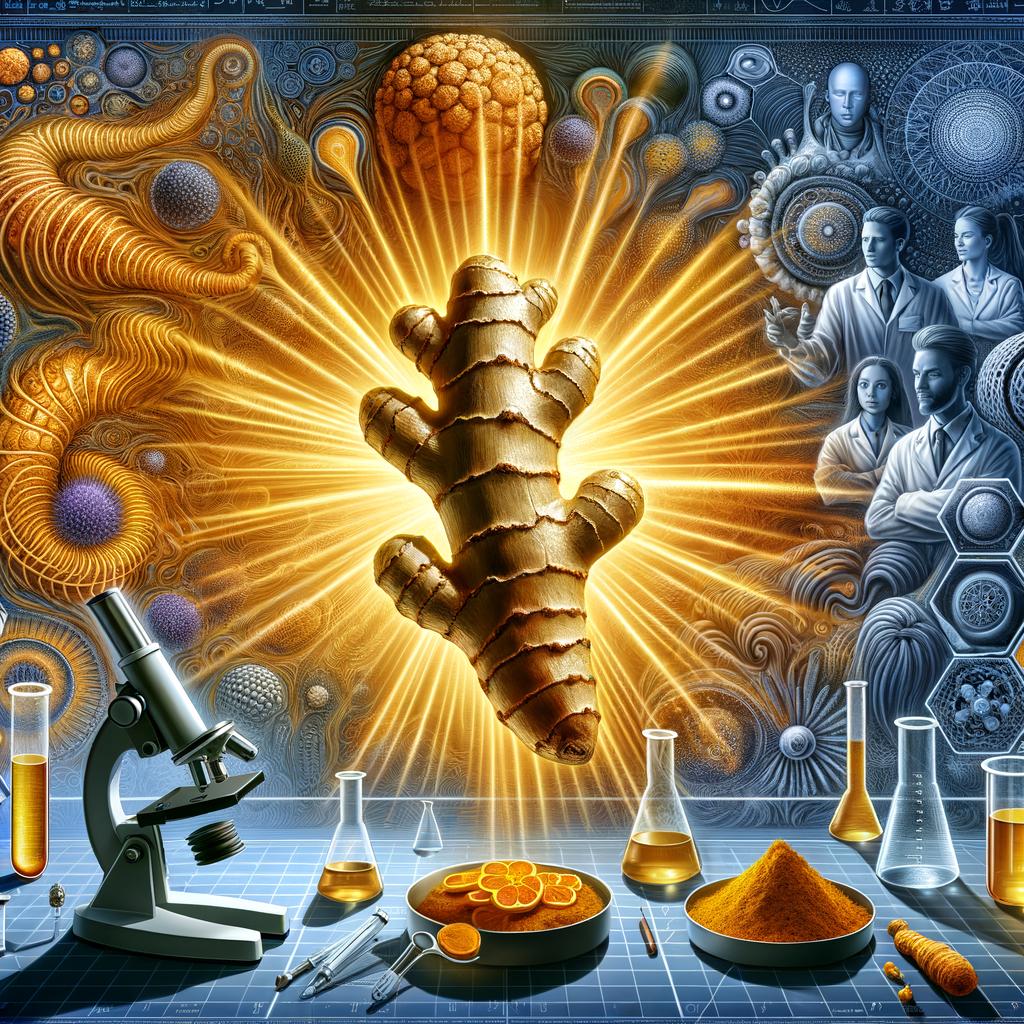Tapping into the mysterious world of esoteric wellness – it’s about time we turned our attention toward the everyday spice stealing the show in our kitchen cabinets, the incredible ‘Turmeric’. With everyone, from your culinary enthusiasts to health gurus, hailing the multiple benefits of this golden spice, it’s worth looking at the lesser-known, yet equally vital, benefits turmeric brings to the table. Today’s blog post takes inspiration from an intriguing YouTube video, “Spicing Up Health: Unpacking the Daily Turmeric Buzz”. We delve deeper into turmeric’s potential for autophagy and mitochondrial biogenesis, as well as its ability to modulate inflammation. But fret not, this isn’t your regular spiel on why turmeric trumps pharmaceuticals. Instead, we journey through a balanced exploration of its unique nuances, bringing you a fresh perspective on this beloved spice.
Table of Contents
- Unveiling the Lesser Known Health Advantages of Turmeric
- Delving Deeper: Turmeric and Its Role in Autophagy
- Turmeric versus Pharmaceuticals: An Apples to Oranges Comparison
- A New Perspective on Inflammation Modulation by Turmeric
- Q&A
- Future Outlook
Unveiling the Lesser Known Health Advantages of Turmeric

In the quest of medical advancement, people are rediscovering traditional herbal remedies with a new perspective, and turmeric is one such magical herb. Beyond adding flavor and color to our dishes, turmeric offers astonishing health benefits, many of which are not commonly known. Autophagy and Mitochondrial Biogenesis are two remarkable advantages presented to us by this golden spice.
To understand turmeric’s impact on autophagy, it is essential to recognize autophagy itself. Autophagy is a cellular recycling process, a survival of the fittest mechanism within our body. In the circumstances of fasting, non-nutritional periods, or exercise, your body essentially chooses the strongest cells to survive, self-destructing the weaker components. This organic recycling process is facilitated by turmeric.
| Advantages | Description |
|---|---|
| Autophagy | A natural selection recycling process, turmeric facilitates the survival of fittest and strongest cells by eliminating weaker ones. |
| Mitochondrial Biogenesis | While further research continues, preliminary studies suggest turmeric plays a vital role in triggering mitochondrial biogenesis, leading to improved metabolic health. |
Simultaneously, turmeric also plays a potential role in mitochondrial biogenesis. Though it is a topic of extensive research, initial studies suggest that turmeric has a profound influence on triggering this process. Mitochondrial biogenesis is the formation of new mitochondria, leading to improved metabolic health and potentially combating various metabolic disorders. Alongside these advantages, turmeric is known for its inflammation modulating effects, contributing to our health from a different perspective.
- Autophagy: As a facilitator in the cellular recycling process, turmeric helps in the survival of the strongest cells by self-destructing weaker ones.
- Mitochondrial Biogenesis: Turmeric potentially triggers the formation of new mitochondria which can lead to improved metabolic health.
- Inflammation Modulating: Known for its diverse health benefits, turmeric also displays excellent inflammation modulating effects.
Please note that while the benefits of turmeric are numerous, it should never replace medical advice or pharmaceuticals when they are necessary. It is about integrating a balanced blend of nature’s best offerings into our daily routine. So, let’s spice up our health with this miraculous golden herb, shall it be in our food or as a dietary supplement.
Delving Deeper: Turmeric and Its Role in Autophagy

The esoteric potential of turmeric lies not only in its more commonly known anti-inflammatory properties, but also in a less-discussed mechanism known as autophagy. Autophagy, derived from the Greek auto (self) and phagein (to eat), in essence, is a cellular recycling process. Under various conditions like fasting, exercising, or simply not eating, our bodies switch to survival mode, becoming more efficient and utilitarian.
Prime components of a cell that are deemed unnecessary or harmful are actively self-destructed and consumed to conserve energy. It’s a primal, survival-of-the-fittest mechanism at play, where only the stronger cells survive. Fascinatingly, turmeric has been found to wield substantial influence in stimulating this process. The exact mechanics remain somewhat of a mystery, but always a rich field primed for deeper exploration and understanding.
Currently, it’s important to understand that turmeric is not in direct competition with pharmaceuticals. Comparatively, the two fall into distinct categories, akin to comparing apples to oranges. One should accurately perceive turmeric’s role as a dietary supplement that can be harnessed to support your health and wellness journey, rather than a direct pharmaceutical alternative.
| Turmeric | Pharmaceuticals |
|---|---|
| Natural dietary supplement | Medicine prescribed by your doctor |
| Promotes autophagy | Targets specific conditions |
| Anti-inflammatory | Varied effects according to the drug |
Turmeric versus Pharmaceuticals: An Apples to Oranges Comparison
In the debate surrounding turmeric and pharmaceuticals, it’s crucial to remember that these substances serve different purposes and can be viewed as comparing apples to oranges. Turmeric qualitatively differs from standard pharmaceuticals, bringing manifold benefits that extend beyond the generalised ones we are accustomed to. Shining a spotlight on some of these benefits, we’re diving into the realm of autophagy, mitochondrial biogenesis, and inflammation modulation. Turmeric, in this sense, is not superior to any established pharmaceutical; rather, it’s a precisely unique component that carries its own profound set of benefits.
Delving into the nuances, let’s begin to unpack the concept of autophagy – a process of cellular recycling that enhances overall bodily efficiency. It’s akin to a survival of the fittest mechanism within our own bodies, where superfluous parts of a cell get self-destructed and consumed, thus promoting stronger cell survival. Interestingly, turmeric has been found to wield a powerful influence over this process. This feature, coupled with its role in mitochondrial biogenesis – the process of producing new mitochondria – and its anti-inflammatory effects, positions turmeric as a versatile player in improving health. Please note, the information provided here is not to be construed as medical advice.
A New Perspective on Inflammation Modulation by Turmeric
Let’s delve into a flavorful discussion about turmeric. This wonder spice has effectively ventured beyond the boundaries of ancient medicine and the kitchen, offering potential health benefits that extend beyond the more commonly recognized benefits. I want to shed light on the lesser-known angles of turmeric in relation to modulating inflammation – effects not readily recognized in past discussions. Important disclaimer: This isn’t medical advice or a comparison of turmeric and pharmaceuticals. The two can’t be compared, akin to comparing apples and oranges.
| Health Aspects | Turmeric Effects |
|---|---|
| Autophagy | Your body’s mechanism for cellular recycling. It’s your body’s version of survival of the fittest at a cellular level, where unnecessary cellular components are self-destructed and consumed. |
| Mitochondrial Biogenesis | A process that leads to the growth of new mitochondria, vital for energy production within the body. |
| Inflammation modulation | Effective control of the body’s inflammation levels accounting not damage healthy tissues. |
Turmeric has significant effects on autophagy which is a key driver of cell health. It ensures that only the fittest cells survive, promoting overall wellbeing. Another less explored benefit of turmeric is in the realm of mitochondrial biogenesis – a process that allows the creation of new mitochondria and consequently, energy production. Turmeric’s unique take on inflammation modulation offers a new way to look at this potent spice. The power of turmeric is more than meets the eye – it’s time to spice up your health routines!
Q&A
Q: What is the subject and context for the discussion in this video?
A: The subject of the video is the benefits of turmeric to health. However, unlike many others, this video seeks to integrate a unique perspective focusing on slightly esoteric benefits such as autophagy and mitochondrial biogenesis, as well as inflammation.
Q: What disclaimer does the speaker issue before going into the discussion?
A: The speaker clarifies that while discussing the benefits of turmeric, they are not prescribing it as medical advice nor arguing that turmeric is superior to any pharmaceutical.
Q: Does this video have a sponsor? If yes, who is it?
A: Yes, this video is sponsored by 4505, a brand noted for their products which include humanely raised pork. They are introducing new product called “Butcher Snacks”.
Q: What are the key benefits of turmeric being discussed in the video?
A: The key benefits that are being discussed in the video are autophagy, which is the body’s process of cell recycling, and mitochondrial biogenesis, which is the process of creating new mitochondria in the body. The speaker also touches upon the inflammation modulating effects of turmeric.
Q: What unique products is the sponsor (4505) offering for consumers?
A: The sponsor, 4505, is offering a new product called “Butcher Snacks” which are portable pork snack sticks. They come in three different flavors which include original, red hot, and cheddar, and bacon.
Q: Where can viewers buy the newly introduced product by 4505?
A: The newly introduced product by 4505 is available in places like Sprouts and Whole Foods, and they’re also coming soon nationwide. Moreover, 4505’s butcher snacks are available on Amazon. There is a special link provided in the video that offers a discount for those interested in trying them out.
Q: What is autophagy and its relation to turmeric?
A: Autophagy is the body’s mechanism of cell recycling where it disposes of unnecessary or dysfunctional cell components. It’s a process enforced during activities such as fasting and exercising. The speaker mentions it as one of the benefits linked to the consumption of turmeric.
Future Outlook
As we unpack the daily turmeric buzz, it leaves us with a taste of esoteric insights that go beyond its rampant acclaim. From autophagy to mitochondrial biogenesis, the role of this humble spice in myriad bodily mechanisms fathoms deep. We tread on the path less taken, sparing no details about its role in inflammation mitigation, maintaining scientific integrity throughout. A friendly disclaimer – let’s not compare turmeric and pharmaceuticals; their virtues rest in different realms.
We also dipped into the world of 4505’s humanely raised pork offerings; a meaty interlude to our spice-centered narrative. Savor their fresh butcher snacks in tantalizing blends of original, red hot, cheddar, and bacon for your on-the-go dietary needs – all bearing the hallmark of high ethical standards.
Notwithstanding, the conversation around turmeric transcends food, breaching the confines of realm of the medicinal. As illustrious as it is, it is equally complex, and further unravelling this golden spice requires more than just a skim. So, as you savor your turmeric tea or toss some in your curry, remember, this spice is stirring up reasons for us to toast to better health every day.

